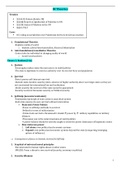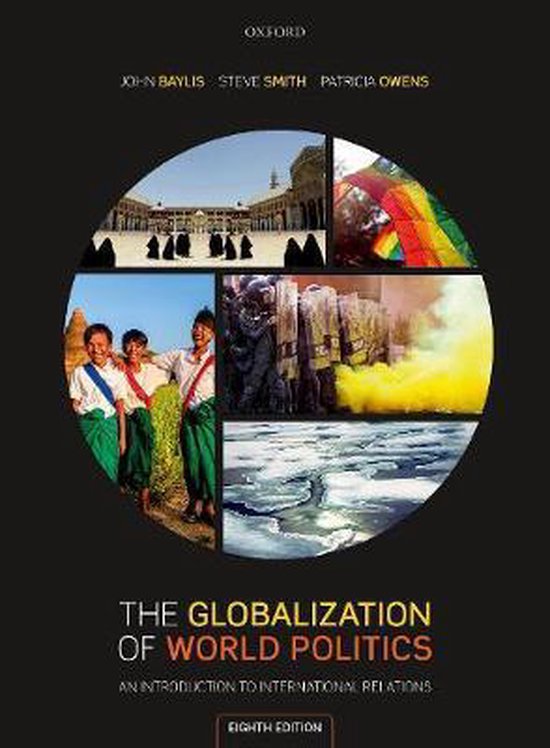IR Theories
Treaties
2.1.4: ICJ Statute [Article 38]
2.1.12: Report on Application of Palestine to UN
2.1.13: Status of Palestine in the UN
2.2.1: VCLT
Cases
ICC ruling on jurisdiction over Palestinian territory & German reaction
1. Foundational Theories
-Explains reality of world
o Realism, Liberal Internationalism, Historical Materialism
2. Anti-foundational/constitutive Theories
-Central role for individual in changing reality of world
o Social Constructivism
Theory 1: Realism [3 Ss]
1. Statism
-Sovereignty makes states the main actors in world politics
-The state is legitimate to exercise authority over its own territory and population
2. Survival
-State’s pursue self-interest=survival
-Outside states borders anarchy exists: absence of higher authority above sovereign states so they are
not constrained by international law and institutions
-Under anarchy the survival of the state cannot be guaranteed
-Security=survival: Economic security or Political security
3. Self-help [non-interventionist]
-Fundamental principle of state action in anarchical system
-Each state ensures its own survival without intervention
Main tool: Power Politics
-Power is self-help and leads to survival
-Defined in terms of militarisation
-If state feels survival is threatened it should power by military capabilities or military
alliances
-This means war is the natural outcome of world politics
-A power balance should be actively sought to check the power dominance of hegemonic states
How states use power
1. Left alone: own political and economic systems
2. Expand: own political and economic systems beyond the state [conquering/enlarging
sphere of influence]
Consequences of focus on Statism, Survival & Self-help
1. Sceptical of universal moral principles
-Not interested in human rights abuses in other states
-UNLESS: Poses a threat to own survival [security, economy or politics]
2. Security dilemma
1
, -State increases power by militarisation
-Creates suspicion among neighbours who then also militarise
Theory 2: Liberal Internationalism
1. Not state-centric
-Diminished role for state sovereignty in world politics
-Many actors in world politics: individuals, multinational corporations, transnational actors and
international organizations
2. Peace through Law
What: Promotion of liberal democracies
-Western style democracy based on fair elections, rule of law, and human rights
-Liberal Peace Theory [Kant]=‘Liberal states are pacific in their international relations with one
another’ need liberal democracies worldwide because they are natural allies and have never gone to
war
How: International institutions
-States do not exist in an anarchical system
-State’s pursuit of self-interest is constrained by international law and institutions
-International law and institutions represent the common interest of all states
-Resolve disputes without war
3. Helping others [interventionist]
-Liberal states or international institutions/law should intervene in other states in order to pursue
liberal objectives
-Moral obligation to protect others
-Liberal objectives: Human rights, democracy, rule of law
Theory 3: Historical Materialism
1. The Capitalist Economy
-The global capitalist economy not the state controls world politics
-States have to play by the rules of the global capitalist economy
2. Focus on class
-The most important actors in world politics are classes, not sovereign states
-States, Multinational Corporations and International Organizations represent the dominant class
interest in world politics which makes them inherently unfair
3. Emancipation through law
-The Law is set up [IOs] to represent the dominant class interest to the detriment of the rest
-Law needs to be changed
-Emancipation through law [ESCRs/CPRs] to overthrow inherently unfair system
Theory 4: Social Constructivism
1. Social construction of reality
-Individuals can drive change and have a large role to play in international life
-The ideas and identities of individuals give meaning to reality
2. Social interaction Social structures
-Institutions are social structures
2
, -Facilitate social interaction between states which leads to common ideas and identity
-Resolve disputes without war
3. Individuals Drive Global Change
-World politics is created by changing ideas and identities
Diffusion: How a norm spreads within a population
Socialisation: How states change their behaviour to identity with existing members of club
The life cycle of norms: How norms evolve
a. Norm emergence: Norm entrepreneur [individual]
b. Norm cascade: Norm diffuses though the rest of the population [sign treaty]
c. Norm internalization: Norm is accepted and not contested so now shapes ideas and
identities [after treaty is signed]
Theory 5: Feminism
1. Inclusion of women in politics
-Women and gender must be included in the study of politics
-Other theories of IR are biased because they reflect only mens experiences, role and status
-Focusing on women’s experience, role and status
-Reveals that women are routinely exposed to gender violence & are absent from decision-making and
institutions
2. Gender is power
-Focus on men and women
-Masculinity & femininity produce a hierarchy of power relations
Masculinity: Rationality, power, independence and the public sphere
Femininity: Irrationality, need for protection, domesticity and the private sphere
3. World politics is gendered
-Key concepts of world politics [state, war, security] are gendered
-This means they organize power relations between genders
-Need to look at the role masculinity or femininity play in the concept
Gendered States
-Masculinity makes men rulers and women ruled
Gendered Security
-Masculinity makes men the protectors of women and children as soldiers
Gendered war
-Masculinity shapes war and sexual violence committed towards women [rape]
ICC ruling on territorial jurisdiction over Palestinian Territory
Facts
Jurisdiction over Palestine for crimes committed in occupied Palestinian territory
Clash between realism and liberalism: Article 12(2)(a) ICC Statute interpretation of ‘state’
Article 12: Preconditions for the exercise of jurisdiction
(2) In the case of article 13, paragraph (a) or (c), the Court may exercise its jurisdiction if one or more of the
following States are Parties to this Statute or have accepted the jurisdiction of the Court in accordance with
paragraph 3:
(a) The State on the territory of which the conduct in question occurred or, if the crime was committed on
board a vessel or aircraft, the State of registration of that vessel or aircraft;
Article 123[3]: Accession to the treaty
‘Statute shall be open to accession by all states’ 3
, ICC Perspective
ICC Jurisdiction=Question of treaty interpretation [Liberal]
Not state-centric:
-States are not the main actors in world politics [non-member observer state]
Para 93: Article 12[2] establishes that the reference to ‘the state on the territory of which the conduct
in question occurred’ in Article 12[2][a] must in conformity with Article 12[2] be interpreted as
referring to a ‘state party’ to the statute
Para 98: The GA has accepted Palestine as a non-member observer state in the United Nations [...] as a
result Palestine can become a party to any treaty that is open to ‘any state’
GA RES 67/19
Para 102: Regardless of Palestine’s status under general international law, its accession to the Statute
followed the correct and ordinary procedure
Para 104: Article 12(2) (a) of the Statute must be understood as defining the territorial parameters of
the Courts jurisdiction for the sole purpose of establishing individual criminal responsibility
Para 106: Therefore, the reference to ‘The State on the territory of which the conduct in question
occurred’ in article 12(2)(a) of the Statute cannot be taken to mean a State fulfilling the criteria for
statehood under general international law.
Para 108: Indeed, given the complexity and political nature of statehood under general international
law, the Rome Statute insulates the Court from making such a determination, relying instead on the
accession procedure and the determination made by the United Nations General Assembly
German Perspective
ICC jurisdiction=Question of fulfilling criteria of Statehood [realism]
Statism:
States are the most important actors in world politics
4






